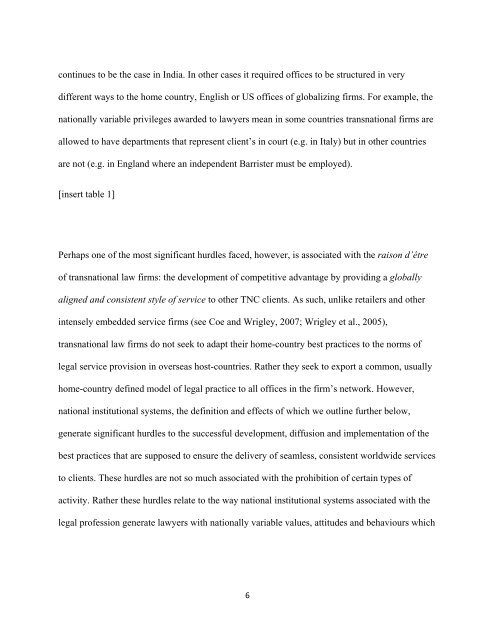Learning to be a lawyer in transnational law firms: communities of ...
Learning to be a lawyer in transnational law firms: communities of ...
Learning to be a lawyer in transnational law firms: communities of ...
You also want an ePaper? Increase the reach of your titles
YUMPU automatically turns print PDFs into web optimized ePapers that Google loves.
cont<strong>in</strong>ues <strong>to</strong> <strong>be</strong> the case <strong>in</strong> India. In other cases it required <strong>of</strong>fices <strong>to</strong> <strong>be</strong> structured <strong>in</strong> very<br />
different ways <strong>to</strong> the home country, English or US <strong>of</strong>fices <strong>of</strong> globaliz<strong>in</strong>g <strong>firms</strong>. For example, the<br />
nationally variable privileges awarded <strong>to</strong> <strong><strong>law</strong>yer</strong>s mean <strong>in</strong> some countries <strong>transnational</strong> <strong>firms</strong> are<br />
allowed <strong>to</strong> have departments that represent client’s <strong>in</strong> court (e.g. <strong>in</strong> Italy) but <strong>in</strong> other countries<br />
are not (e.g. <strong>in</strong> England where an <strong>in</strong>dependent Barrister must <strong>be</strong> employed).<br />
[<strong>in</strong>sert table 1]<br />
Perhaps one <strong>of</strong> the most significant hurdles faced, however, is associated with the raison d’être<br />
<strong>of</strong> <strong>transnational</strong> <strong>law</strong> <strong>firms</strong>: the development <strong>of</strong> competitive advantage by provid<strong>in</strong>g a globally<br />
aligned and consistent style <strong>of</strong> service <strong>to</strong> other TNC clients. As such, unlike retailers and other<br />
<strong>in</strong>tensely em<strong>be</strong>dded service <strong>firms</strong> (see Coe and Wrigley, 2007; Wrigley et al., 2005),<br />
<strong>transnational</strong> <strong>law</strong> <strong>firms</strong> do not seek <strong>to</strong> adapt their home-country <strong>be</strong>st practices <strong>to</strong> the norms <strong>of</strong><br />
legal service provision <strong>in</strong> overseas host-countries. Rather they seek <strong>to</strong> export a common, usually<br />
home-country def<strong>in</strong>ed model <strong>of</strong> legal practice <strong>to</strong> all <strong>of</strong>fices <strong>in</strong> the firm’s network. However,<br />
national <strong>in</strong>stitutional systems, the def<strong>in</strong>ition and effects <strong>of</strong> which we outl<strong>in</strong>e further <strong>be</strong>low,<br />
generate significant hurdles <strong>to</strong> the successful development, diffusion and implementation <strong>of</strong> the<br />
<strong>be</strong>st practices that are supposed <strong>to</strong> ensure the delivery <strong>of</strong> seamless, consistent worldwide services<br />
<strong>to</strong> clients. These hurdles are not so much associated with the prohibition <strong>of</strong> certa<strong>in</strong> types <strong>of</strong><br />
activity. Rather these hurdles relate <strong>to</strong> the way national <strong>in</strong>stitutional systems associated with the<br />
legal pr<strong>of</strong>ession generate <strong><strong>law</strong>yer</strong>s with nationally variable values, attitudes and <strong>be</strong>haviours which<br />
6
















